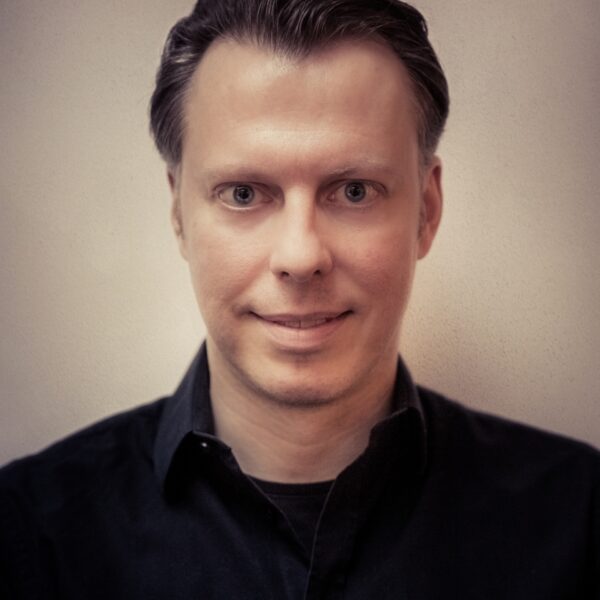David Philip Hefti

Despite his classically avant-garde musical language, Hefti’s prime concern is expressiveness – addressing his listener with a candid eloquence. He loves powerful contrasts and does not refrain from writing intense cantilenas. His music is capable of cumulative processes of concentration, and can unleash a vehement drive. (Süddeutsche Zeitung)
As both composer and conductor, David Philip Hefti has been one of the most renowned and most successful Swiss musicians for years. As Composer in Residence at the Zermatt Music Festival in the current 2023/24 season, he will be active in both his primary fields of activity. The cornerstone of his engagement is the world première of his Des Zaubers Spuren (Traces of Magic), an octet composed to celebrate the 40th anniversary of the Scharoun Ensemble Berlin. Hefti will also be conducting the Zermatt Festival Orchestra, and will mentor the students of the Zermatt Music Festival Academy. Shortly after the Festival, Traces of Magic will be given its first performance in Germany at the Scharoun Ensemble’s 40th-anniversary concert in the Philharmonic Hall in Berlin. Reinhold Friedrich will also be giving the first performance of a miniature for Wolfgang Rihm, entitled Fanfare for Wolfgang – for solo piccolo trumpet. The new work Reigen (Round Dance) – Mosaic for Violin and Clarinet will continue Hefti’s collaboration with the violinist Patricia Kopatchinskaja and the clarinettist Reto Bieri. At the end of the season, the Stradivari Quartet will give the world première of Hefti’s Eighth String Quartet in Prague, followed by performances in Zurich and Basel. He is currently working on a solo work for violin that is to be the compulsory piece at the Second Stuttgart International Violin Competition of the Guadagnini Foundation.
David Philip Hefti’s oeuvre encompasses some 90 works, including orchestral, vocal and chamber music. He has composed large-scale orchestral works, solo concertos, works for chamber orchestra, string quartets, solo pieces, song cycles and two operas. Hefti has enjoyed a working relationship of several years’ standing with artists such as Benjamin Appl, Juliane Banse, Mojca Erdmann, Viviane Hagner, Patricia Kopatchinskaja, Christian Poltéra, Lawrence Power, Hartmut Rohde, Baiba Skride, Jan Vogler and Antje Weithaas, who all perform his music.
As both conductor and composer, Hefti has worked with numerous orchestras and ensembles including the Zurich Tonhalle Orchestra, the Bavarian State Orchestra, the Symphony Orchestra of Bavarian Radio, the Deutsches Symphonie-Orchester Berlin, the Vienna Radio Symphony Orchestra, the Orchestre symphonique de Montréal, the Tokyo Sinfonietta, the Berlin Baroque Soloists, the Scharoun Ensemble Berlin, the Ensemble Modern, the Amaryllis Quartet and the Leipzig String Quartet. His orchestral works have been performed by conductors such as Peter Eötvös, Cornelius Meister, Kent Nagano, Jonathan Nott, Michael Sanderling, Mario Venzago and David Zinman. He has been invited to music festivals including Wien Modern, Beijing Modern, Ultraschall Berlin, the Lucerne Festival, the Gstaad Menuhin Festival, the Schleswig-Holstein Music Festival, Heidelberger Frühling, the Pablo Casals Festival in Prades, the Dvorak Festival in Prague and the Suntory Festival in Tokyo.
In May 2017, Hefti’s first opera, Anna’s Mask, was given its world première at the St. Gallen Theatre under the baton of Otto Tausk. It is based on the true story of the Swiss singer Anna Sutter, whose life tragically mirrored the fate of her own star role, that of Carmen: her former lover, the conductor Aloys Obrist, murdered her in 1910 in Stuttgart. David Philip Hefti’s musical language, which is characterised by transparency, a chamber-music intensity and a concentrated sense of dramaturgy, is also manifested in this, his first opera. Luminous ecstasy – and this is the point of it – is no betrayal of Hefti’s aesthetic stance, which otherwise tends to fragile, pointillist drops of sound solidifying into chordal structures. (Neue Zürcher Zeitung)
Hefti composed his second music-theatre work, The Snow Queen based on the eponymous fairy tale by Hans Christian Andersen, to a commission from the Zurich Tonhalle Society for its 150th anniversary. The semi-staged world première of this musical tale for the whole family took place in November 2018 in the Tonhalle Maag in Zurich. The title role was sung by the soprano Mojca Erdmann, with the Zurich Tonhalle Orchestra under the baton of the composer himself. This CD recording was released on the NEOS label and was honoured with the Supersonic Award in 2020. In The Snow Queen, the cold takes many audible forms. There are wine glasses filled with water – they sound as clear and transparent as frozen crystals. The serial techniques that always accompany the appearance of the icy queen also come across as frosty and cool – these are academic number games that freeze into lifeless formulae. In stark contrast to all this are the micro-intervals and overtones that unite to create iridescent natural harmonies conjuring up an unsophisticated, real warmth. (Neue Zürcher Zeitung)
Several works by David Philip Hefti were given their world premieres in the recent 2022/23 season: Rhapsody – for Baritone and Orchestra, with texts by Sir Salman Rushdie, was performed by Benjamin Appl, accompanied by the Württemberg Chamber Orchestra Heilbronn under the baton of Case Scaglione. It was followed by Harmonia – for saxophone quartet, performed by the Kebyart Ensemble in the Zurich Tonhalle and the Basel Stadtcasino, and the acclaimed première of Hefti’s first ballet, Ans Ende der Zeit (To the End of Time), for the ballet of the Graz Opera, with choreography by Beate Vollack. The newspaper Die Kleine Zeitung wrote as follows about it: This music is initially urgent and threatening as it traces the steps of the dying process, then transitions into softly seductive sounds that ultimately become existentially painful.Walter Küssner and Diyang Mei, both violists in the Berlin Philharmonic Orchestra, gave the first performance of Hefti’s Vier Anklänge (Four Reminiscences) – for two violas in a “Matinée for Tabea Zimmermann”. To close the season, Hefti’s successful collaboration with the Berlin Baroque Soloists continued with a double pack of first performances: the Five Concertini – for String Orchestra, and Four Moments – for flute and string orchestra (with Philipp Jundt, solo flute) at the Laufen Chamber Music Concerts.
Besides David Philip Hefti’s opera The Snow Queen, two further CDs of his music have been released: The album Light and Shade, which documents Hefti’s longstanding, close collaboration with the Amaryllis Quartet, brings together the works An durchsichtigen Fäden (On transparent threads) for mezzo-soprano and string quartet, with Maria Riccarda Wesseling; Concubia nocte – Music for the second nocturnal vigil (String Quartet No. 5); and Danse interstellaire – Mourning music for basset clarinet and string quartet, with Bernhard Röthlisberger and was described by the magazine Musik & Theater as “Music of existential urgency”. Above and beyond this, David Philip Hefti also gave his conducting debut on the Deutsche Grammophon label. This album, entitled Shades of Love: Korean Drama Soundtracks, was made under the composer’s direction together with top-ranking artists including James Galway, Daniel Hope, Philipp Jundt, Sebastian Knauer, Albrecht Mayer, Richard O’Neill and the Zurich Chamber Orchestra, and reached No. 1 in the Korean classical music charts.
In 2013, Hefti was awarded the Composer Prize of the Ernst von Siemens Music Foundation, in 2015 the Hindemith Prize of the Schleswig-Holstein Music Festival and in 2023 the Composer Award of the International Classical Music Awards ICMA. He has also won the International Composition Competition of the Pablo Casals Festival in Prades, the George Enescu International Competition for Composition in Bucharest, and the International Gustav Mahler Composition Prize. Hefti’s works are published by Edition Kunzelmann and C. F. Peters and have been recorded for CD by various labels such as Deutsche Grammophon, NEOS and col legno. When his CD Changements was released, the Neue Zürcher Zeitung praised his “excellent mastery of the orchestral apparatus”, both as composer and as conductor.
David Philip Hefti was born in Switzerland in 1975 and studied composition, conducting, clarinet and chamber music at the music academies of Zurich and Karlsruhe, where his teachers included Cristóbal Halffter, Rudolf Kelterborn, Wolfgang Meyer, Wolfgang Rihm and Elmar Schmid. He is active today as both composer and conductor, and lives with his family near Basel.
